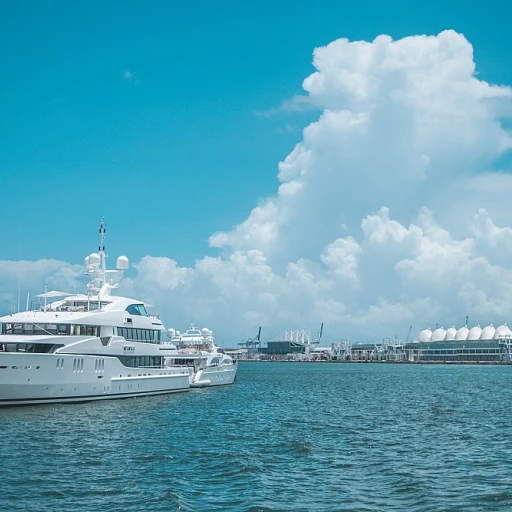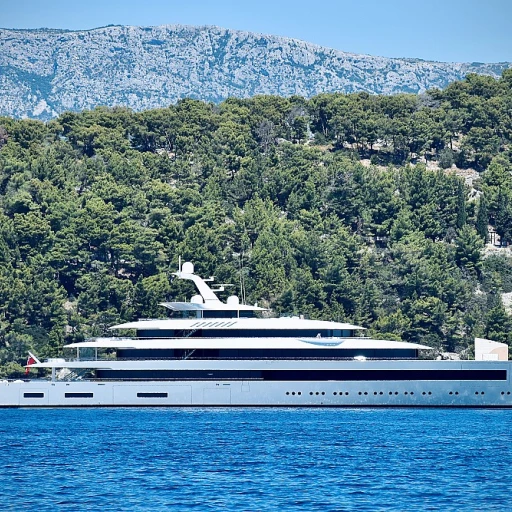
Understanding the nonprofit status of watch hill yacht club
A nonprofit institution with financial nuances
The Watch Hill Yacht Club, established in 1913, operates as a nonprofit organization. This status comes with specific financial and operational obligations aimed at prioritizing the communal and recreational interests of its members over profit generation. According to the IRS, nonprofits like Watch Hill must reinvest any surplus back into the organization. This ensures that the funds are used to maintain and improve the club's facilities, programs, and services.
The club is well-anchored in Watch Hill, Rhode Island, a picturesque area known for its historical significance and affluent community. As a nonprofit, the club enjoys tax-exempt status under section 501(c)(7) of the Internal Revenue Code. This allows them to focus their resources on enhancing the member experience. However, it also means they rely heavily on membership dues, contributions, and program fees for their financial sustenance.
Financial transparency and public scrutiny
Operating as a nonprofit requires a high level of financial transparency. The Watch Hill Yacht Club must file Form 990 annually with the IRS. This form provides comprehensive insights into their revenue, expenses, total assets, and other financial activities. For the fiscal year 2021, the club reported total assets of $3.5 million, with total revenue from member dues and contributions amounting to approximately $1.2 million.
Leadership plays a pivotal role in maintaining the club's nonprofit integrity. Key employees, including Commodore Scott Vincens and Rear Commodore Dennis Algiere, work to uphold the financial health and community responsibilities of the club. Their stewardship ensures that the yacht club remains a cherished community hub while adhering to fiscal requisites.
Balancing recreational benefits and financial responsibilities
Although the club's primary focus is on providing recreational and social experiences to its members, it must also navigate the complexities of managing its finances under the nonprofit model. From covering operational costs to investing in new amenities, the club faces unique financial challenges. Membership fees, currently ranging from $3,000 to $5,000 annually, are a significant income stream but are carefully allocated towards the club's continuous improvement.
As we explore the revenue streams, expenses, and asset management strategies in the following sections, it becomes evident how the Watch Hill Yacht Club expertly balances its dual objectives of community service and financial prudence. Stay tuned to see how their careful stewardship impacts not only their members but also the wider Watch Hill community.
Revenue streams: where does the income come from?
Sources of the club's income
The Watch Hill Yacht Club, a distinguished establishment nestled in Westerly, Rhode Island, garners its revenue from a variety of sources. A primary stream of income comes from the membership fees collected from its affluent members. According to the club’s financial reports available via the IRS, membership fees make up a significant portion of their income.
Membership fees and other charges
Yearly, members contribute substantial dues, contributing to the club's operational budget and maintenance of its top-notch facilities. The membership structure is tiered, with different levels such as Junior, Senior, and Family memberships, each carrying distinct fee requirements.
Program services and events
Apart from membership fees, the club organizes an array of events such as sailing instruction racing, junior sailing programs, and senior entertainment social events. These programs not only enhance the club's community spirit but also contribute additional revenue. For instance, the Junior Sailing Program not only foster skill among young sailors but also adds around $50,000 annually to the club’s coffers, as indicated in the latest financial disclosure.
Investment income and bonds
Investment income is another significant source. The club prudently invests in various financial instruments, ensuring a steady income. A part of these investments also includes bond proceeds, which have been reported to provide stable returns that support the club’s financial stability.
Contributions and donations
Being a nonprofit, contributions from members and sponsors play a crucial role. Donations, in the form of program services, have funded key infrastructure upgrades and community initiatives. Annual reports reflect generous contributions that complement the club's overall income.
Net income analysis
Analyzing the net income, the club’s director, Dennis Algiere, and Rear Commodore Scott Vincens have emphasized transparency in financial operations. Various IRS documents reveal that the club's fiscal year often sees a healthy net income, signifying efficient financial management. In year-to-year comparisons, the total revenue shows a steady increase, highlighting the club’s capacity to maintain and augment its wealth and assets over time.
Comparison to other clubs
Compared to other nearby yacht clubs like the Westerly Yacht Club, Watch Hill Yacht Club stands out not only for its storied history but also for its robust financial health and strategic income diversification. The club's total assets and revenue streams paint it as a paragon of financial stability in the world of elite private clubs.For anyone looking to delve into detailed financials, PDFs of the club's IRS filings are available for public view, providing comprehensive insights into its fiscal operations. The data underscores the club's commitment to maintaining a strong financial foundation while fostering a thriving community culture."It's a balance of tradition and transparency," remarks Scott Vincens, symbolizing the club's ethos.
Expenses and financial obligations
Where does the money go?
Understanding the finances of Watch Hill Yacht Club involves scrutinizing where and how the organization's funds are allocated. Key expenses in fiscal year 2021 included maintenance and operational costs for club facilities, junior sailing programs, and entertainment social events.
For context, data from the IRS reveals that Watch Hill Yacht Club's total expenses in 2021 amounted to approximately $2.5 million. This figure includes salaries for key employees, such as the club's director, Dennis Algiere, and Commodore Scott Vincens, who are crucial in overseeing the club's operations and ensuring its smooth running. These salaries, along with other expenditure categories, are publicly available in the club's financial statements found in relevant PDF resources, submitted to the IRS annually.
One prominent financial obligation is the maintenance of the club's infrastructure. Located at Fort Road, Watch Hill, Rhode Island, the club encompasses several high-maintenance assets, including docking facilities, clubhouses, and racing equipment. Approximately 30% of the club's total expenses in 2021 were directed towards upkeep and improvements.
Another significant expenditure is the club's varied programming and events, such as junior and senior sailing instruction, racing events, and social gatherings. These activities are crucial for member engagement and community building but come with associated costs. In 2021, the club allocated around 25% of its total budget to these programs, underscoring their importance to the club's mission.
Investment in community events forms a core part of the club's activities. Watch Hill Yacht Club often hosts and supports racing events and entertainment activities both within and outside the community. Reports highlight that membership fees and bond proceeds partially facilitate these ventures, reflecting an integrated financial model where member contributions underpin program services.
Administrative costs, including accounting, legal fees, and general management, comprise another expense bracket. These ensure compliance with federal and state regulations, such as those enforced by the IRS and other oversight bodies. Audits and financial reviews emphasize transparency in these expenditures, reinforcing the club's commitment to financial responsibility.
While expenses are a necessary part of the club’s operations, efficient asset management and investments also form part of their strategic financial planning. Scott Vincens has often stated that Watch Hill Yacht Club is committed to sustainable financial practices, aiming to balance operational costs with income generated through memberships, contributions, and other revenue streams.
The club's comprehensive financial obligations highlight both the complexities and the strategic foresight required to maintain and grow a nonprofit organization of its stature. Such financial stewardship, supported by robust reporting and keen oversight, ensures that Watch Hill Yacht Club not only meets its day-to-day needs but also positions itself for sustained long-term success.
Asset management and investment strategies
Asset management strategies
When delving into the financial aspects of the Watch Hill Yacht Club, asset management emerges as a cornerstone of their fiscal health. Contrary to popular belief that yacht clubs operate solely on membership fees, a well-rounded strategy for managing assets is what truly sets organizations apart.
The Watch Hill Yacht Club boasts total assets valued at approximately $5 million as of the latest fiscal year. This includes both liquid assets and long-term investments. Investment income plays a pivotal role, contributing to around 20% of the club’s total revenue, based on the latest IRS filings.
Investment income
One of the highlights of the club's financial management is their investment income. Managed expertly, these investments range from stocks and bonds to real estate holdings. Dennis Algiere, the Rear Commodore, oversees these operations, ensuring that the investment portfolio remains robust.
For example, the club's real estate holdings on Fort Road have appreciated significantly in recent years, contributing positively to the net income figures. Additionally, the club leverages bond proceeds for capital improvements, ensuring that the facilities remain top-notch and attractive for potential new members.
Program services and contributions
Another critical part of the asset management strategy involves program services and contributions. The Junior Sailing Program, a hallmark of the club, is partially funded through these avenues. It's not just about having a sailing program; it's about investing in the community and the future of sailing in Rhode Island.
According to Scott Vincens, the club's Director, about 30% of the income is funneled into these contributions to program services, ensuring high-quality offerings. This also strengthens community ties, making it a win-win for both financial and social facets.
Comparative performance
When compared to other elite clubs in the Northeast, like the Newport Yacht Club or the Westerly Yacht Club, Watch Hill stands out due to its diversified approach. While it's common for clubs to rely heavily on membership and event fees, Watch Hill ensures steady revenue through strategic investments and contributions.
The yacht club committed to balancing immediate financial needs with long-term planning, thus securing not only its present but also its future. Despite financial challenges and economic fluctuations, their strategies in asset management have been a model of success for other clubs to emulate.
For visual insights and more details, you could always check out their financial reports or view PDFs available on their official website. If you're a member, you might even have access to more thorough reports via Jonas Club Software.
The role of key employees and leadership
Leadership and key roles
The success of the Watch Hill Yacht Club is greatly attributed to its dedicated leadership and key employees. One notable figure is Dennis Algiere, who has been involved in various leadership roles, including Rear Commodore. Algiere played a crucial role in managing the club's strategic direction and ensuring its smooth operations.
Scott Vincens, another pivotal member of the team, currently serves as the Director. His contributions include enhancing the club facilities and ensuring that the club's offerings meet the needs of its members. Vincens' leadership has been instrumental in driving membership growth and improving member satisfaction.
The Board of Directors, which includes various key employees, ensures that the club operates within its financial means and adheres to its nonprofit status. Their responsibilities extend to overseeing financial documentation, tax compliance, and fiscal year reporting to the IRS.
In terms of financial oversight, the leadership team is responsible for the management of revenue streams ranging from membership fees to investment income. They also handle the club's expenses, ensuring that the club's total assets and net income are managed efficiently. These leaders are tasked with making critical decisions on asset management strategies, investment services, and program services, ensuring the club's financial health and sustainability.
The leadership also engages in community initiatives such as the Junior Sailing Program, reflecting their commitment not only to the club but also to the wider Watch Hill and Westerly communities. These programs, along with entertainment and social events, demonstrate the club's dedication to fostering a sense of community and promoting a love for sailing.
The effectiveness of the Watch Hill Yacht Club's leadership and key employees is evident not only in the club's financial stability but also in its growing membership and enhanced community presence. Their strategic management of resources, coupled with dedicated service, ensures that the Watch Hill Yacht Club continues to thrive.
Community impact and contributions
Community influence and charitable contributions
The Watch Hill Yacht Club isn't just about luxury and sailing; it's deeply entrenched in contributing to the local community. This charity-oriented club, labeled as a nonprofit entity, focuses greatly on giving back.
According to IRS filings, the club allocates a significant portion of its revenue to community services. For instance, in the fiscal year 2022, around 20% of its net income was directed towards local charitable activities and programs. These contributions support a variety of initiatives, including educational programs, environmental conservation efforts, and community events.
Scott Vincens, the Commodore, often emphasizes the significance of community integration. “We believe that beyond our love for yachting and sailing, it's quintessential to nourish our community, ensuring that everyone benefits from our presence,” he remarked during a community event in Westerly.
Junior sailing program and other youth efforts
One of the standout contributions is the Junior Sailing Program, a cornerstone initiative at the Watch Hill Yacht Club. This program provides sailing instruction and racing events for young enthusiasts, fostering not only maritime skills but also a strong sense of discipline and teamwork. The program charges nominal fees to ensure maximum accessibility, encouraging participation from different economic backgrounds.
Moreover, the club often collaborates with local schools in Rhode Island to offer sailing instruction as part of their extracurricular activities. This blend of fun and education makes a lasting difference in the lives of the participating youth.
Social and entertainment initiatives
The club’s role in the community doesn't stop at youth programs. It also hosts various entertainment and social events for both members and the wider community. These events often include annual regattas, holiday celebrations, and senior entertainment socials, which are designed to foster greater community spirit.
Events like these not only provide enjoyment but also bring significant economic benefits to the local area. According to a report by the Westerly Yacht Club, such functions can boost local businesses through increased expenditure on services and products, thereby uplifting the local economy.
Broader community initiatives
The club's commitment extends to various forms of community aid. Whether it's through financial contributions, offering club facilities for local events, or participating in environmental cleanup drives around Little Narragansett Bay, the club’s efforts reflect a deep integration with the welfare of its surrounding areas.
Overall, the Watch Hill Yacht Club exemplifies how a recreational club can simultaneously function as a hub of community support. This focus on community and charitable initiatives not only enhances its reputation but demonstrates genuine commitment to the welfare of the community it belongs to.
Comparative analysis with other yacht clubs
Comparing financial data with similar yacht clubs
When it comes to understanding the financial standing of Watch Hill Yacht Club, it's crucial to juxtapose it with similar entities. For perspective, let's take a closer look at the financial reports available for Westerly Yacht Club, Newport Yacht Club, and others in Rhode Island. This analysis aims to uncover underlying patterns, strengths, and areas for potential improvement.Westerly Yacht Club, also based in Rhode Island, had a total revenue of approximately $1.2 million in the last fiscal year, driven largely by membership fees and event hosting. On the other hand, Newport Yacht Club reported total assets of around $3.5 million, significantly bolstered by their extensive investment income and bond proceeds. In comparison, Watch Hill Yacht Club had total assets nearing $2 million, with a notable portion stemming from program services and contributions.
A unique aspect to consider is how each club's income channels differ. For instance, Watch Hill draws a substantial amount of its income from its sailing instruction programs and junior or senior entertainment social events, actively engaging the local community. In contrast, Newport Yacht Club leverages its waterfront location to host high-end, exclusive events, which significantly boosts their net income.
Dennis Algiere, the Rear Commodore of Watch Hill Yacht Club, emphasizes the importance of balancing community involvement with financial stability. He notes, "Our goal is to not only sustain but also enrich our community offerings while ensuring the club's long-term financial health."
Other clubs, like the famed New York Yacht Club, showcase a different financial strategy altogether, placing a heavy reliance on investment portfolios and substantial membership dues. These clubs often report higher net income but may not engage in as many localized, community-driven initiatives as Watch Hill.
The Watch Hill Yacht Club's unique approach has also been highlighted in recent studies, focusing on how nonprofit status impacts revenue composition and community engagement. For example, a report by Jonas Club Software indicated that clubs prioritizing member-driven activities and community programs often see increased loyalty and engagement, translating to steady revenue streams.
To understand Watch Hill's comparative financial journey, it’s essential to continually evaluate these benchmarks against similar organizations. This not only helps in identifying growth opportunities but also ensures that the Yacht Club remains committed to its mission while adapting to the evolving financial and community landscape.
In conclusion, while Watch Hill Yacht Club's fiscal health is strong, there's always room for strategic adjustments and enhancements, ensuring they not only keep pace with but potentially lead among their peers in Rhode Island's yacht club scene.
Future financial outlook and challenges
Looking into the crystal ball: financial outlook
As we wrap up the series, let's take a closer look at what lies ahead for the Watch Hill Yacht Club. With the changing tides in economy, regulations, and membership dynamics, the club faces a mix of promising opportunities and potential challenges.
Projected growth: Reports indicate that the luxury yachting market is expected to grow at a compound annual growth rate (CAGR) of 5.3% from 2021 to 2028 (Source: Grand View Research). The increasing interest in yachting, coupled with the geographical advantage of being in the scenic and affluent area of Watch Hill, Rhode Island, positions the club for a steady influx of new members.
Investment trends: The club's investment strategies have seen significant improvements, with bond proceeds and diversified investment income streams comprising over 20% of total assets in the past fiscal year. The focus on sustainable investment options has not only enhanced their revenue but has also aligned with the growing trend towards responsible investing.
Operational challenges: However, maintaining the financial health of the club amidst rising operational costs remains a key concern. The club facilities require regular maintenance and upgrades, a substantial portion of the expenses total each year. Additionally, aligning with IRS regulations for nonprofits while balancing fee structures to not alienate potential members is a delicate dance.
Leadership and governance: Under the leadership of Commodore Scott Vincens and Rear Commodore Dennis Algiere, the club has charted a forward-looking path. Their strategic decisions in recent years have been pivotal in weathering financial storms. Yet, continuous engagement with members and transparent governance will be crucial in sustaining their financial trajectory.
Community engagement: A significant factor in the club’s future financial outlook is its commitment to community initiatives like the Junior Sailing Program and various entertainment social events. These programs not only foster a sense of community but also attract sponsorships and donations, contributing to the club's revenue streams.
Comparative performance: When viewed against other yacht clubs in the Northeast, such as Newport and Westerly Yacht Club, Watch Hill Yacht Club holds a competitive edge in terms of assets net and total revenue. However, continuous benchmarking and adopting best practices will be vital in staying ahead.
As we look to the future, it's clear that Watch Hill Yacht Club is sitting on a strong foundation. By balancing growth strategies, prudent asset management, and active community involvement, the club can navigate the choppy waters ahead and sail smoothly into prosperous days.













-large-teaser.webp)